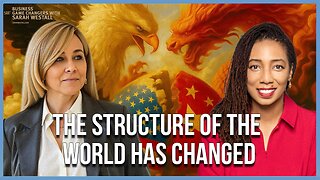Premium Only Content

No Logic in Morocco, nor citizenship!
Logic is the study of correct reasoning. It includes both formal and informal logic. Formal logic is the study of deductively valid inferences or logical truths. It examines how conclusions follow from premises due to the structure of arguments alone, independent of their topic and content. Informal logic is associated with informal fallacies, critical thinking, and argumentation theory. It examines arguments expressed in natural language while formal logic uses formal language. When used as a countable noun, the term "a logic" refers to a logical formal system that articulates a proof system. Logic plays a central role in many fields, such as philosophy, mathematics, computer science, and linguistics.
Logic studies arguments, which consist of a set of premises together with a conclusion. An example is the argument from the premises "it's Sunday" and "if it's Sunday then I don't have to work" to the conclusion "I don't have to work".[1] Premises and conclusions express propositions or claims that can be true or false. An important feature of propositions is their internal structure. For example, complex propositions are made up of simpler propositions linked by logical vocabulary like
∧{\displaystyle \land } (and) or
→{\displaystyle \to } (if...then). Simple propositions also have parts, like "Sunday" or "work" in the example. The truth of a proposition usually depends on the meanings of all of its parts. However, this is not the case for logically true propositions. They are true only because of their logical structure independent of the specific meanings of the individual parts.
Arguments can be either correct or incorrect. An argument is correct if its premises support its conclusion. Deductive arguments have the strongest form of support: if their premises are true then their conclusion must also be true. This is not the case for ampliative arguments, which arrive at genuinely new information not found in the premises. Many arguments in everyday discourse and the sciences are ampliative arguments. They are divided into inductive and abductive arguments. Inductive arguments are statistical generalizations, such as inferring that all ravens are black based on many individual observations of black ravens.[2] Abductive arguments are inferences to the best explanation, for example, when a doctor concludes that a patient has a certain disease which explains the symptoms they suffer.[3] Arguments that fall short of the standards of correct reasoning often embody fallacies. Systems of logic are theoretical frameworks for assessing the correctness of arguments.
-
 2:46:27
2:46:27
Laura Loomer
6 hours agoEP151: Democrats Meet With Terror Tied Islamic Group During Government Shutdown
20.9K16 -
 3:02:06
3:02:06
TimcastIRL
5 hours agoPortland Police PROTECT Antifa From DHS Arrest, Trump Admin Says SEND IN THE GUARD | Timcast IRL
211K121 -
 2:49:50
2:49:50
Barry Cunningham
5 hours agoPRESIDENT TRUMP SPEAKS TO THE PRESS...NO DEALS! DO YOU CARE IF THE GOVERNMENT STAYS SHUT DOWN?
37.8K24 -
 1:37:24
1:37:24
Tundra Tactical
3 hours ago $4.92 earned🚨🚨Emergency Gun News!!!!🚨🚨 Did Glock Just Cave To Liberal Pressure?? Current Glocks Done?
22.8K4 -
 1:02:57
1:02:57
Sarah Westall
7 hours agoStructure of the World has Changed and Getting Back to Basics w/ Stacy Washington
39.7K10 -
 6:34
6:34
Buddy Brown
9 hours ago $4.96 earnedWatch What Happens When WELFARE QUEENS Get Denied FOOD STAMPS! | Buddy Brown
30.9K23 -
 LIVE
LIVE
Drew Hernandez
15 hours agoCHARLIE KIRK TRIAL JUDGE ISSUES GAG ORDER & U.S. MARSHAL ILLEGAL ALIEN SHOOTOUT?
971 watching -
 DVR
DVR
DLDAfterDark
4 hours ago $1.46 earnedIs Glock Anti 2A?? Glocks Terrible Recent Decisions & More
17.9K15 -
 1:58:02
1:58:02
tminnzy
4 hours agoLAST REMAINING BLACK OPS 6 PLAYER 🦁
16.9K1 -
 LIVE
LIVE
Side Scrollers Podcast
2 days ago🔴SIDE SCROLLERS FUND-A-THON🔴DAY 2🔴100% REVENUE HELPS CHANGE CULTURE!
844 watching